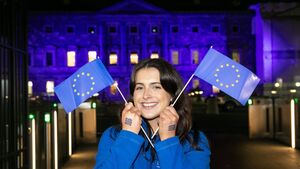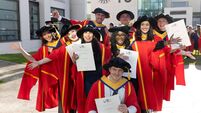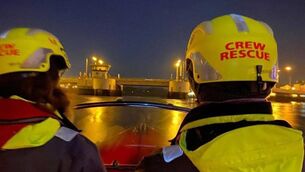Fr Liam Power: The European Elections: Revisiting Robert Schuman's Vision

Pictured at the launch of the European Parliament in Ireland’s “Use Your Vote” campaign to promote voter turnout in the June 7 European elections, is Katie Smith, a European Parliament Schuman trainee. Photo: Gareth Chaney
I received my polling card in the post recently, reminding me of my duty to vote in the elections on June 7.
There is a bewildering array of candidates vying for votes in the local elections and for the European Parliament.
The choice is made more difficult by the lack of clarity on posters. We don’t know whether candidates are running for the local or European elections.
Be that as it may, I will focus for now on the elections for the new European Parliament.
I find the founding vision of the EU project to be deeply inspiring. I was challenged to revisit this extraordinary vision earlier this year when Pope Francis declared Robert Schuman as Venerable, a preliminary step on the road to beatification and canonisation.
Schuman was perhaps the most influential personage in the establishment of what is now the European Union.
He served as Prime Minister and Foreign Minister in the French Government in the post-war era. In 1950, he gave a powerful speech proposing that a pooling of economic resources would lead to cooperation and friendship between Germany and France.
He urged that coal and steel resources should be pooled between European countries as a way to avoid future conflict. Such cooperation, he argued, would make another war on the continent both unthinkable and impossible.
The plan became known as the Schuman Declaration. This declaration initiated a process that ultimately evolved into the European Union as we understand it today.
Pope Francis reminded us on the 70th anniversary of the declaration: “From that point on there came a long period of stability and peace, which we continue to benefit from today.”
Schuman was a believing and prayerful Catholic. He saw himself as a Christian humanist who understood politics as a mission and a service and as an act of obedience to God’s will.
He envisioned the European project as a community, which embraced the values rooted in the gospel and which should be central to the European weltanschauung or philosophy of life.
Pope Francis speaking to the European Parliament in 2014 highlighted the hope that Schuman and other founding fathers of the EU had in their fellow man: “However, bruised by war and its aftermath they believed that men and women were capable of working together, of building bridges and of fostering peace and fellowship.”
It is clear that the EU as such is an unfinished project. As we decide on how we should vote perhaps we could challenge candidates and ask them if they would embrace a reappropriation of the foundational values of the EU project.
I am particularly concerned about the rise of Eurosceptic conservatives and far-right Eurosceptics, who believe that integration has gone too far and must be curtailed if not even rolled back.
I believe that as Christians we cannot so attempt to idolise national sovereignty to the extent that we cut ourselves off from the neighbouring countries.
It is important to preserve our national identity but it is necessary to transfer some powers to a supranational entity to enforce international commitments on climate change for example.
We should not forget that the EU, whilst not perfect, still manages to bring around the table many countries that could easily see themselves as competitors.
The Commission of the Bishop’s Conference of the European Union called on all Christians to vote for candidates and parties who clearly support the European project and who will promote Christian values such as respect, compassion, equality and care for our common home.
Environmental protection and alleviating climate change are two very divisive issues facing the electorate in this campaign. Commentators, such as theologian Benoit Willemaers, are highlighting how populist parties are “exploiting a wave of popular pushback against anything that involves extra costs in relation to environmental protection”.
They promote a toxic narrative that suggests ecological objectives are counter-productive and should be pared back. They believe economic growth should be prioritized.
The newly elected EU Parliament will face enormous challenges in relation to migrants.
I would certainly question candidates on their stance on the pact, which was agreed in European Institutions last December. Over 50 organisations have judged that the immigration pact will “normalise the arbitrary use of immigration detention, increase racial profiling and return individuals to so-called safe third world countries where they are at risk of violence of torture and arbitrary imprisonment.”
Christians cannot support such policies.
Tragically, after decades of peace, we have war now in Ukraine.
The original dream of the Founding Fathers of the European project was that peace should prevail.
Pope Francis has appealed to all European leaders to agree on one fundamental principle, that war cannot be considered a solution to conflicts.
“War is a failure of politics and humanity.“ This fundamental principle must be shared by all candidates.
Only then can we be faithful to the vision of Venerable Robert Schuman.






